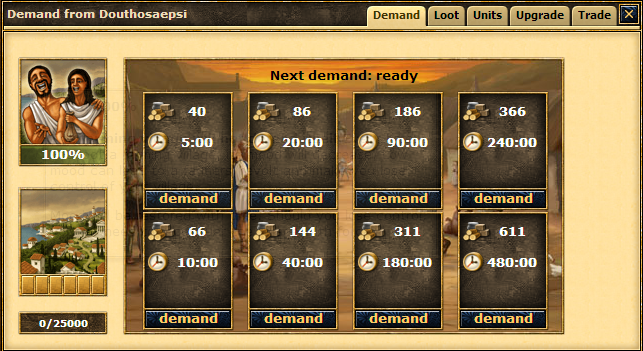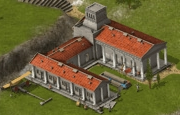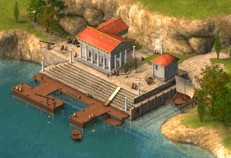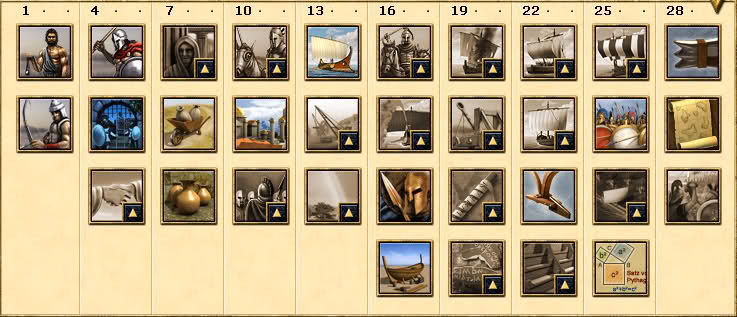Building a City
 | Please Note This is a guide written by Asjo for the .EN forums. Please not that this guide can differ from someone else's thoughts. Everyone uses different techniques, but this can help. |
This guide will try to give you a sense of what's important when building up a city. I will start by explaining why to prioritize some buildings and then I will explain how priorities might very in different situations.
Farming Villages
When you start a new city, you should make sure to get your farming villages as soon as possible. If you're a very active player (who makes 5-minute demands for at least three hours every day), they will be your main source of income.Getting six of the eight farming villages on your island is quite easy. They get harder to take every time your capture a new one. To take the first four farming villages, simply get some slingers. They will easily defeat what is defending the farming villages. There will be 60 swordsmen defending the fifth farming village, so build some hoplites to defeat the fifth farming village as well. The sixth farming village can be defeated with 60 slingers (although, if you have them, using horsemen is optimal, and you need as few as 15), but you will need at least 150 slingers to defeat the seventh farming village. Always capture the farming villages with the highest levels first. Other players on your island have separate farming villages (meaning they can own all eight farming villages even though you do the same), so what you do with the farming villages has no effect on other players on your island, except if you expand them (then others on the island will benefit, since the levels are same for all players).
While you are online, you demand resources from your farming villages. Initially, you will have the choice of four different demands, and when you research booty, you will have eight different choices:
The example here comes from a farming village that is level 5. Every time you have some excess resources, it would be wise to use them to expand your farming villages since this will gain you more resources in the long run. If you demand 36 of each resource, you have to wait five minutes before you can demand from that village again, but if you demand 555 of each resource, you will have to wait 480 minutes (eight hours). One very important thing to note is the lower option you choose, the more resources per minute you will get. This makes a huge difference. Here, if I choose to get 36 of each resource, I will get 7,2 of each resources per minute. Meanwhile if I choose, I will only get 1,15 of each resources per minute. So, this system greatly favours people who spend a lot of time on demanding resources from the farming villages. If you are able to stay online for a while and demand resources every five minutes, this will earn you much more resources than if you only demand every eight hours. But when you go to sleep, of course, the best option is the eight hours, since you will not be demanding resources while you sleep.
Here is an illustration of the difference in resources if you were to use the different demand-options for a full 24 hours (with level 5 farming village used as an example):
| Demand Time | Quantity of resources/village |
|---|---|
| Every 5 minutes | 10,368 each resource/village |
| Every 10 minutes | 8,640 each resource/village |
| Every 20 minutes | 5,616 each resource/village |
| Every 40 minutes | 4,716 each resource/village |
| Every 90 minutes | 2,720 each resource/village |
| Every 180 minutes | 2,264 each resource/village |
| Every 240 minutes | 1,998 each resource/village |
| Every 480 minutes | 1,665 each resource/village |
Keep in mind that you can also select the loot-option for double the resources and a decrease in the mood of your farming village. Just be careful; once the mood of your farming village drops below 80% (or 64% if you have researched diplomacy), your farming village will revolt if you loot. So, you will lose it and have to capture it back. However, if I'm going to sleep and I loot the farming village causing the mood to decrease by 96%, this does not mean that I lose the farming village. It simply means that the mood will be at 4%, and I should not loot the farming villages before the mood goes to a safe level again (but demanding resources is still fine). Generally I don't loot the farming village to a mood below 80% as this will make me unable to trade with them. If you loot, you should use the 20-minute option where possible as it has the higher ratio of resources per mood percentage. This means that if you don't have too much time to loot, you might as well use the 20-minute option. Otherwise, using the 5-minute option brings you slightly less resources per mood, but will allow you to loot quicker, meaning you can make demands to the farming village afterwards.
A good reason to get market level five early on is that you can trade with farming villages at a really good ratio. The max you can trade with any farming village at a time is 2.000 resources. However, the starting ratio is always 1:1.25, which means that for your 2.000 resources, you get 2.500 back. Once you've traded with a farm, the ratio gets worse, so you have to wait a while until you can trade at the best ratio again. Each farming village can only make a specific trade - wood for stone, for instance. However, if you can manage to plan ahead and balance your resources, trading with farming villages is an easy way to get resources. If you have six farming villages, you just need to trade once with them all to earn 3.000 resources.
Building Levels
If you max out all your buildings, they will take up 1132 of your maximum 3500 population. The less free population, the small your offensive or defensive army will have to be. And since this game always favors advantage in numbers, it's a good idea to not waste any population that you don't need, allowing you get to your armies as big as possible. If you stick to the most useful levels of your buildings, they will only take up around 900 population. There are certain buildings that you might not want to max out:
Barracks
- Maximum level: 30
- Recommended level: 10 (defensive cities: 5)
- Reason: People who attack really often might want barracks level 30, but otherwise it really isn't necessary. The difference between level 1 and level 30 is no more than a 30% increase in production speed. Barracks level 15 is required for chariots, level 10 for horsemen, but defensive cities won't need either, and can stick with level 5.
Harbor
- Maximum level: 30
- Recommended level 5 (conquest cities: 20)
- Reason: If you have naval cities, it might be worthwhile to build harbor up to level 30 for quick rebuilding if you have several matured cities and never run out of resources to build. But otherwise, it's not really necessary to build harbor past level 5, the level which is required to be able to build Thermal baths. However, you need level 20 harbor to be able to build colony ships. Some will want to be able to do so in all their cities, while others settle for a few cities in strategic positions.
Temple
- Maximum level: 25
- Recommended level: 15
- Reason: At level 15, [[Temple|temple] gives you 7.8 favor per hour. If you get to level 25, you can get 10 favor per hour. This difference does not really justify using 50 more population, especially once you have more cities, where favor production is not as effective when more cities worship the same god.
Market Place
- Maximum level: 30
- Recommended level: 10
- Reason: You only need market place level 10 to be albe to trade with other islands. Having market place level 30 gives you more flexibility when you have many cities running full with resources, but generally isn't necessary. Often you will be able to do with level 10 just fine.
Important Buildings
Harbor
As soon as you build harbor, you get the advantage of having the Phoenician Merchant visit your city. He will visit a city 24 hours after he finished his last (make sure to dismiss him as soon as you have used his offers), but bear in mind that if you have more than one city it's hardly any advantage to get the Phoenician merchant to visit the new city, since he alternates between cities. The reason that Phoenician Merchant provides a decent benefit is that he trades resources to you in a 1:1.50 ratio, which means that apart from the flexibility that trading resources can give you, you earn 50% on top of the resources that you trade. Every time the merchant comes, he demands a different resource. How much you can trade depends on your level of harbor. See a few examples:
Harbor level 1: Trade 800 resources Harbor level 5: Trade 1334 resources Harbor level 10: Trade 2000 resources Harbor level 20: Trade 3334 resources
So, even if you just get level 1 harbor, which is quite cheap, you can trade resources. An added advantage is that the Phoenician merchants offers units. These units cost 50% more than they would in your barracks, and they can only be bought with silver. The advantage is that you can get units you might now have the research to build yet and you get them instantly. So, if you want some units for a quick attack or need some catapults without wanting the research, you can get them this way. For defending, it also comes in handy to instantly summon units.
Another reason that it's important to get the harbor early is the flexibility it gives you to be able to build ships. With just a level one harbor, you can build any ships except colony ships. And without research, you can build transport ships to send units to attack or defend somewhere that your allies might need.
Market Place
The reason that it's important to get market place early is because of the additional income it can provide. Farming villages that you capture will trade with you at a 1:1.25 ratio, meaning that you get earn 25% of what you trade each time. A farming village can at most trade you for 2000 of your resources at one time, and once you trade, it will take around 24 hours for the farming villages to be willing to trade at the best ratio again, with the ratio going to 1:0.50 after the trade and slowly increasing. If you have captured all eight farming villages on an island, you can earn 4000 resources every day through trading. Furthermore, trading with farming villages is a great way to balance your resources if you have an excess or shortage of certain resources. If the farming villages cannot help you here, you also have the option of trading with other players from within the market place.
Temple
Even if you are at your first city and don't find any specific use for a god yet, you should still get temple as early as possible. They first few levels of temple are very cheap in terms of providing a lot of favor at a small cost. At later levels, the benefit compared to the cost will be much lower. While you might not find use for spells against enemies if your city only has 1.500 points and no one is attacking you, some of spells can benefit your resource income. If you build temple level 5, it will gain you 106 favor per day. If you choose Poseidon as your god, you can cast Kingly Gift (800 wood for 25 favor) four times a day, which earn you an added income of 3.200 wood. If you choose Hera, you can cast Happiness on your city almost once a day. If you level were at maximum, the spell would be worth around 8.500 resources, but even if all your mines are level 15, it will still earn you 1.908 resources.
Resource producing buildings
Some people might underestimate the importance of a high level of resource producing buildings (Timber camp, Quarry, Silver mine). But at maximum levels, they will produce 50.400 resources a day. Even if you use demands quite actively from your farming villages, these buildings will likely provide half of your income. That said, if you're an very active player, you might want to stop upgrading these buildings once they reach level 15 and instead get the benefits of academy and temple as early as possible. Later on, once other important buildings are built, you can upgrade the resource producing buildings.
Academy
Many get started on academy right away because they want to be able to conquer others as soon as possible. However, another reason why it's essential to research early are the many accumulative benefits you can get from research. Apart from the acumulative benefits, some research also provides great benefit in short time and at low cost.
Techs with accumulative benefits: Architecture (level 13), Conscription (level 16), Phalanx (level 25), Mathematics (level 25), Battering Ram (level 28) Cheap techs with great benefit: City guard (level 4), Booty (level 7), Ceramics (level 7), Plow (level 22)
There are certain things you should not waste your research point on, while there are others that depend on what the purpose of your city is. See the following example, for instance:
This is a defensive naval city, with on the research necesarry for biremes. Phalanx is researched as well, since land troops sent to defend the city will benefit from that research. If the purpose of the city was different, for instance a multi-purpose city, it would need, at the very least, to research other things as well. You will want fast tranport ships and bunks for attacking, and since slingers and horsemen are the units most commonly used for attacks, you will want them both researched. People rarely use chariots (unless for defense), and you can skip that research and use hoplites as a cheaper replacement. Chariots can be a useful alternative if you often end up with unbalanced resources from just building hoplites, though. If your city is an offensive land troop city, you will likely want to research Trainer, since you will have to rebuild your troops several times.
A normal multi-purpose city, has everything it needs.
There are various things you should never or very rarely research, and I have explained in these below:
Diplomacy: Researching diplomacy does not really help you, unless you log in less that once a day. By lowering the mood at which a farming village with revolt if you loot it from 80% to 64%, the research enables you to loot more. So, if you are not online for a full day, you can loot the farming village with the most effective 5-minute option, get it below 64% and still not waste any mood by having the mood reach 100% (where it cannot grow). However, normally it's very useful to keep the mood above 80% since this will allow you to trade with farming villages, something that can help you balance your researches and provide extra income.
Espionage: Having your spies be 10% quicker is not really enough to make a significant difference. If you need to spy a target before attacking it (usually when you haven't spied on this target recently), then it will save you a bit of time and allow you to start your attack quicker, but 10% still isn't enough to warrant this research.
Bireme: I will not build biremes in cities where I intend to attack. Normally, the attacker will make sure to have enough light ships to kill your biremes, and if he doesn't, he's likely not big enough to attack you anyway. I would rather have one of my cities where I only build biremes, meaning I can send them somewhere to defend and have enough biremes to kill off the entire attacking fleet and the transport ships as well. When you don't have any birimes, you won't have any ships to defend your light ships when they are in your city, so be careful not to leave them in your city when you are offline (at least if people have attacked you with light ships before).
Shipwright: Unless your city is a pure naval city, you will often have the ship that you need and will not need to reproduce them quickly. If your city is one where you make big attacks with offensive land troops, you will likely lose a lot of land trops if you lose all your escorting light ships, so the light ships will reubild more quickly than the land troops anyway.
Democracy: This research will mean that it takes another player 10% longer to capture your city. So, instead of it taking 12 hours, it will take 13,2 hours. Not much of a different, and I do not intend of letting others capture my cities in the first place. Probably the most useless research.
Fire ship: Researching this is pretty useless. Yes, fire ships are fairly cost effective, always killing one ship per fire ship, so you can ignore any bonuses an opponent might get from research and premium-features. But it's normally something you only want to use if you are always outnumbered and on the defensive. Fire ships are slow and cannot attack. They cannot kill transport ship or colony ships, so it someone conquers your city, he will simply get the fire ships. Fire ships will only enter battle once your other ships are killed, so the only thing their numbers will serve to do is to kill enemy light ships that otherwise would have done you no harm.
Cryptography: All this research really will do is to save you some silver from time to time. If you have 1000 silver in your cave, people who spy onm your city will need 1.201 silver to get their spy through. Really not very worthwhile, especially since people will often use a bit more silver than they have to.
Breakthrough: This can be really useful against a player who has a naval sea defense as it means many more of your transport ships will get through. However, situation where this pays off will be rare, not to mention that you will lose many more of your light ships in the attack. So, generally, it's not worthwhile to research this, even though it can be under certain circumstances (if you often have massive land armies that outnumber your opponents but only few light ships to accompany, or if an alliance you are at war against have loads of biremes). Keep in mind, though, that even though your land troops kill all enemy land troops, you still cannot capture a city if it still has ships left defending it, so breakthrough is mostly useful to break a siege on your own city (if you play in conquest world), since you can get through the biremes that are sent in support of the beseiged city and kill the land troops, which will break the siege.
Trireme: A very versatile ship, which can both defend and attack. The advantage of a slightly stronger ship to defend (compared to bireme) is that is some marginal situations, you would not lose a trireme where you would lose a bireme. However, building triremes isn't at all cost effective, since a trireme costs 1,75 times as much as a light ship, but has less attack and costs 2,5 times as much as a bireme, but only has 1,6 times as much defense.
Meteorology: Unless you have a lot of enemies that you attack often on the same island as you city, it's a bit of a waste to research this. It does not affect the speed of units when they are travelling in a ship. I do not know whether this research affects flying units, but I think it does. So, if you have a city where you only build manticores, this would be useful to research.
Crane: Once you max out your buildings, this research is of no use at all. It might be worthwhile to research early to get the benefit, but just remember that it costs one culture point to reset research later. The cost of this culture point might be equalized through the benefit of getting buildings that can gain you resources earlier, but it's certainly not a given choice to get this research.
Special buildings
The special buildings are the ones on the bottom on each side of your building tree. You can only build two in total, one from each side. Therefore, you must choose carefully which special buildings to build.
On the left side, people will almost always build Thermal baths. With maximum farm and Plow researched, you maximum population is 3200. With Thermal baths, your maximum population will be 3500, which makes a big difference when you want your attack or defense to be as effective as possible due to size in numbers. The alternatives are not great. Theater can enable to to get culture points a bit cheaper than you can from city festivals through theather plays. However, each theather play takes 2,5 days to complete, while a city festival takes only 12 hours. Of course, if you have way too many resources, constantly having city festivals in all your cities, Theather can provide you an added source of culture points, but its use is reallly quite limited. Library gives you added research points, but this should not really be necessary if you choose your research carefully. Lighthouse makes your ships 15% faster, which definitely is a significant advantage. With this advantage, your enemies will have less time to react to your attacks and you will have more time to send support to allies. However, this advantage comes into play too rarely to be worth cutting down your maximum population, and I would only really recommend it in a defensive naval city (one that only builds biremes).
On the right side, the choice is less obvious. Most peope will build tower, which provides a 10% strength bonus to both defending naval and land units. However, the pitfall of this, in conquest worlds, is that once your city is besieged, the large number of biremes send to help support the siege will have the benefit that the tower provides. In such a situation, it will likely end up providing a greater benefit to your enemies than yourself. In all other cases, it provides a decent benefit, though, that can easily end up being worthwhile, especially since you cannot destroy a tower (unlike city walls, for instance). Meanwhile, Divine Statue gives you a decent increase to favor production. Many players will often keep their favor near max, and won't need to reproduce it too quickly, but if you need to cast Sea Storm, a spell that costs 280 favor points, twice in the duration of incoming attacks from an enemy, it is necessary to have quick favor regeneration. Once you have more cities worshipping the same god, though, the boost provided by Divine Statue is not as significant, though, and it loses much of its usefulness. Merchant's Shop is useful as well, since it increases the ratio in farming villages to 1:1.35, meaning that you can suddenly earn 5.600 resources a day per city if you own all eight farming villages on an island instead of 4.000 resources. You also get better rates at the Phoenician merchant, allowing you to earn more resources when he visits. Apart from that, it increase the trading capacity of your market place by 50%, which can be useful to some. Oracle is useless, since anyone who keeps a big city for a few weeks will likely have deposited 50.000-100.000 silver in the cave, meaning that they will likely stop anyone trying to spy on them. This makes Oracle redundant, and most attacks later in the game will likely be blind anyway (without spying first). A viable option is not to build your special building on the right side, since you save 60 population and don't lose any great benefit.
Keep in mind that each special building is worth 500 points, even if they don't cost much. So, don't build them before you need them, as they will make your city a more attractive target.
Matching your playing style
When you understand why the different buildings are important, you really just need to match your playing style while building a city. Never have too low a warehouse, for instance. You cannot have more resources in your city than what you can keep in your warehouse, so if you're an active player who gains a lot of resources through demanding, attacks or trading, these will be lost if you bring in resources once the limit of the warehouse has been reached. Such an active player might want level 10 cave early as well, since its unlimited silver capacity makes sure you always have a useful place to deposit excess silver (if you're in a peaceful period, where you don't rebuild any defense, chances are you will have too much silver, unless you attack more often with horsemen than slingers). Some people will be able to build a city up quickly and just make sure to max out the academy right away so that they can make use of the combat bonuses as they start building up an army. Others will want to research the battle research quickly and need academy for that reason. Other players log in less than once a day, and will likely need to focus on their mines early as they will be the main source of income.


















